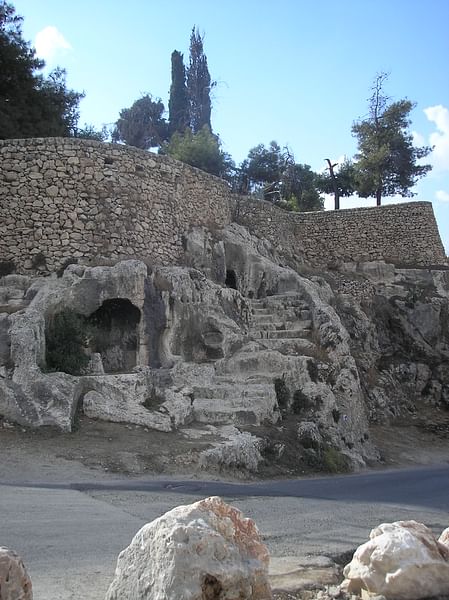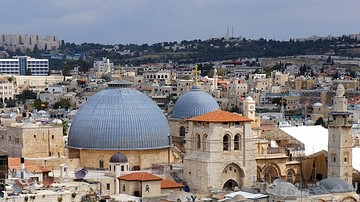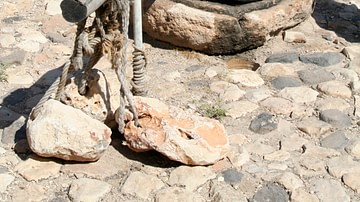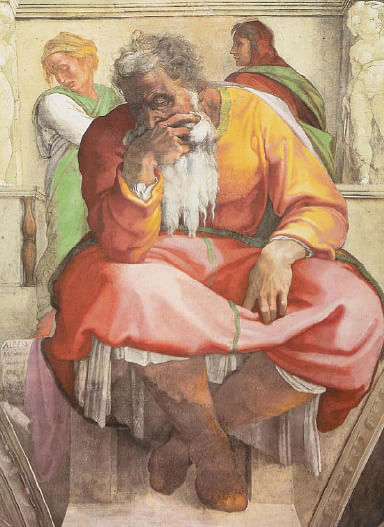
Jeremiah (c. 650-570 BCE) was a major prophet of Israel in the Hebrew Bible. In addition to his book of prophecy, he is also credited with writing the Books of Kings and Lamentations (perhaps written by his scribe, Baruch). Called to prophecy c. 626 BCE, we know more about the life of Jeremiah than any other prophet.
Prophets
Prophets were the Jewish version of oracles in the ancient world. It was a term for a person as well as a place. Categorized as divination, this was the way humans communicated with their gods. The oracle was possessed by the deity and served as a vehicle for the words. Sometimes the deity appeared in a vision. At other times, the prophet could experience an out-of-body journey to heaven and receive information from God or his angels.
In 722 BCE, the Assyrian Empire conquered and destroyed the Northern Kingdom of Israel. This was when ten of the twelve tribes of Israel were lost to history. In 587 BCE, the Babylonian Empire conquered and destroyed the Southern Kingdom of Judah and Solomon's Temple in Jerusalem. The prophets of Israel explained both disasters by claiming that the sins of the Israelites (specifically their idolatry) led God to punish them. However, they also offered a message of hope: sometime in the future, God would intervene once more in the final days (eschaton in Greek). At that time, he would restore Israel to its former glory and rectify all injustice.
The Call of Jeremiah
Jeremiah was called by God to announce the impending destruction by the Babylonians in 626 BCE. He was the son of Hilkiah, a priest, from the village of Anathoth (in the territory of the tribe of Benjamin).
The word of the Lord came to me, saying, "Before I formed you in the womb I knew you, before you were born I set you apart; I appointed you as a prophet to the nations." "Alas, Sovereign Lord," I said, "I do not know how to speak; I am too young . . ." Then the Lord reached out his hand and touched my mouth and said to me, "I have put my words in your mouth. See, today I appoint you over nations and kingdoms to uproot and tear down, to destroy and overthrow, to build and to plant" (Jeremiah 1:4-10).
The Ordeals of Jeremiah
Through his preaching as well as his symbolic deeds, Jeremiah suffered persecution. The men of his village attempted to kill him, but God warned him to flee. A Temple official had him beaten and placed in stocks at the Upper Gate of Benjamin for a day. During the reign of King Zedekiah, God commanded Jeremiah to make a yoke and wear it around the Temple. This indicated that the nation would soon be under the yoke of Babylon.
God ordered Jeremiah to buy a clay pot (or jar) and smash it outside of the Potsherd Gate and say to the people:
I am going to bring a disaster on this place that will make the ears of everyone who hears of it tingle. For they have forsaken me and made this a place of foreign gods; they have burned incense in it to gods that neither they nor their ancestors nor the kings of Judah ever knew, and they have filled this place with the blood of the innocent. They have built the high places of Baal to burn their children in the fire as offerings to Baal (Jeremiah 19:3-5)
A previous evil king, Manasseh, had built this type of altar atop the Valley of Hinnom in the city and burned children. This site became symbolic of an early version of hell, Gehenna.
Another official urged the king to put him to death because his preaching disheartened the soldiers and the people. Jeremiah was thrown into a cistern, buried in mud. A Cushite (an Ethiopian Jew) pulled him from the mud, but he remained in prison until Jerusalem fell in 587 BCE. The Babylonian attitude toward Jeremiah was quite different; they released him and kindly let him choose where he wanted to live. He went to Mizpah with Gedaliah, who was made the governor of Judea.
Gedaliah was assassinated and succeeded by Johanan, who ignored Jeremiah's advice not to flee and moved his community to Egypt. He took Jeremiah and his scribe and the king's daughters.
This is what the Lord Almighty, the God of Israel, says: "I will send for my servant Nebuchadnezzar king of Babylon. ... He will come and attack Egypt, bringing death to those destined for death, captivity to those destined for captivity, and the sword to those destined for the sword. He will set fire to the temples of the gods of Egypt; he will burn their temples and take their gods captive. As a shepherd picks his garment clean of lice, so he will pick Egypt clean and depart. There in the temple of the sun in Egypt he will demolish the sacred pillars and will burn down the temples of the gods of Egypt." (Jeremiah 43:10-13)
Egypt was conquered by the Babylonians after the Battle of Carchemish in 605 BCE. This is no record of Jeremiah's death. He probably spent his last years in Egypt.
Critique Against the Native Cults
A dominant theme in the construction of ancient religious views was the necessity of fertility; fertility of people, crops, and herds. Thus gods were always depicted as accompanied by goddesses (consorts), and human procreation became essential for survival. The prophets of Israel utilized allegory and metaphors of marriage and divorce to critique these concepts where they claimed that the sin of idolatry led to sexual immorality. God was the bridegroom and Israel was to be the faithful bride.
In a well-known passage from Jeremiah, he charged the Jews with adopting native rituals which led to an immoral lifestyle:
"If a man divorces his wife and she leaves him and marries another man, should he return to her again? Would not the land be completely defiled? But you have lived as a prostitute with many lovers—would you now return to me?" declares the Lord. "Look up to the barren heights and see. Is there any place where you have not been ravished? By the roadside you sat waiting for lovers, sat like a nomad in the desert. You have defiled the land with your prostitution and wickedness. Therefore, the showers have been withheld, and no spring rains have fallen. Yet you have the brazen look of a prostitute; you refuse to blush with shame." ... During the reign of King Josiah, the Lord said to me, "Have you seen what faithless Israel has done? She has gone up on every high hill and under every spreading tree and has committed adultery there? (Jeremiah 3:1-6)
"Every high hill" and "under every spreading tree" are references to the images of the local Baals (Canaanite deities) and their female consorts. He berated women who "burned incense to the Queen of Heaven" (Jeremiah 44:19), Astarte. It should be noted that prophetic polemic against the idolatry of the Israelites does not constitute historical proof of such sins. The charge is a rationalization to explain why God permitted the conquest and destruction by foreign powers.
Confessions & Lamentations
Several passages in Jeremiah are described as his personal confessions, in the sense that he mourns the fact that his preaching has not resulted in the salvation of Israel. Lamentations are poetic structures perhaps based upon older traditions of Mesopotamian city laments. A city lament mourned the desertion by traditional gods which enabled an enemy to conquer and slaughter. Much like funeral dirges, the passages address the dead to explain their current fate. However, the city lament ended in hope, in the construction of a new city/temples. Lamentations, on the other hand, omits this concept, in the historical context that Jerusalem had not yet been restored.
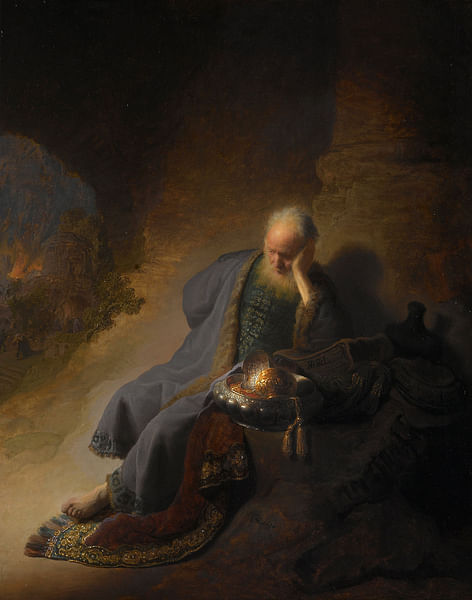
The Lost Ark
The books of the Maccabees described the rebellion against the Greek ruler of the Seleucid Empire, Antiochus Epiphanes (r. 175-164 BCE) in 167 BCE. He attempted to forbid Jewish customs and defiled the altar and the Temple with an erection of the statue of Zeus. Jews, under the leadership of the Hasmonean family, rebelled and drove him out.
2 Maccabees opened with a story that became legendary:
One finds in the records that the prophet Jeremiah [before the Babylonian conquest] ... ordered that the tent and the ark should follow with him, and that he went out to the mountain where Moses had gone up and had seen the inheritance of God [Mt. Nebo]. Jeremiah came and found a cave-dwelling, and he brought there the tent and the ark and the altar of incense; then he sealed up the entrance. Some of those who followed him came up intending to mark the way, but could not find it. When Jeremiah learned of it, he rebuked them and declared: "The place shall remain unknown until God gathers his people together again and shows his mercy. Then the Lord will disclose these things, and the glory of the Lord and the cloud will appear, as they were shown in the case of Moses, and as Solomon asked that the place should be specially consecrated." (2 Maccabees 2:1-8)
Archaeologists, as well as adventurous amateurs, have continually searched the region for the site of the "Lost Ark."
Rabbinic Judaism
Later Rabbinic literature (the Aggadah) utilized a passage from Moses' farewell speech in which God said: I will raise up for them a prophet like you [Moses] from among their fellow Israelites, and I will put my words in his mouth. (Deuteronomy 18:18). They claimed that Jeremiah was this new Moses and compared their experiences (including rebellion against the discourses of both).
Christianity
There are 40 direct quotations from Jeremiah in the Christian New Testament. The prevailing utilization was based on Jeremiah 31:31-34:
"The days are coming," declares the Lord, "when I will make a new covenant with the people of Israel and with the people of Judah. It will not be like the covenant I made with their ancestors when I took them by the hand to lead them out of Egypt, because they broke my covenant, though I was a husband to them," declares the Lord. "This is the covenant I will make with the people of Israel after that time," declares the Lord. "I will put my law in their minds and write it on their hearts. I will be their God, and they will be my people. No longer will they teach their neighbor, or say to one another, 'Know the Lord,' because they will all know me, from the least of them to the greatest," declares the Lord. "For I will forgive their wickedness and will remember their sins no more."
God had to send Jesus into the world to declare a new covenant. Jeremiah's railing against the corrupt and idolatrous Jews became Christian proof for why God had permitted the Romans to destroy Jerusalem and the Temple in 70 CE. At the same time, a "covenant written on their hearts" became the justification for the acceptance of believing Gentiles without the ethnic identity-markers of Jews: circumcision, dietary laws, and observance of Sabbath.
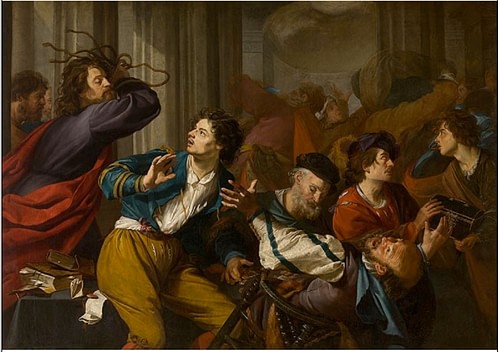
The sufferings and persecutions of Jeremiah may have influenced the way in which Mark's gospel portrayed the harassment, persecution, and eventual suffering of Jesus by the Jews from the very beginning of his ministry. Mark's Temple Incident, where Jesus overturned the tables of the animal sellers and money-changers, reflects Jeremiah's demonstrations of impending doom in the Temple courts.
Paul the Apostle to the Gentiles utilized a similar concept from Jeremiah to argue that in his vision of Jesus, he was called to his mission: "God, who set me apart from my mother's womb and called me by his grace, was pleased to reveal his Son in me so that I might preach him among the Gentiles"(Galatians 1:15-6).

